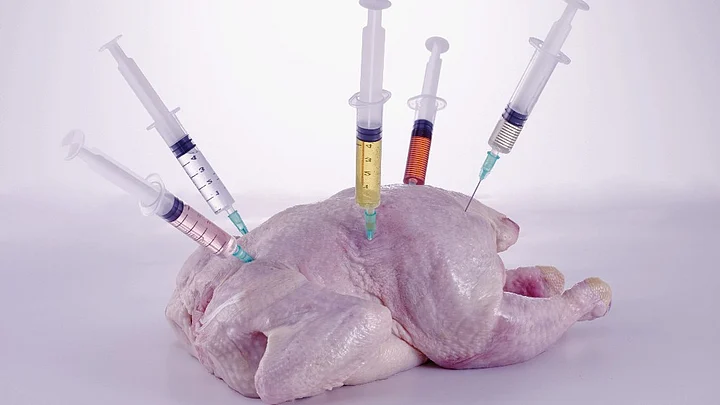India used 2,633 tons of antibiotics in food animals in 2013. Globally, we are the fourth largest consumer of antibiotics in animal food production.
Couldn’t care less?
A new study predicts that if this trend continues, then the figure will increase by a whopping 82 percent by 2030.
Which means India will be using 4,796 tons of antibiotics. Yes!
A new study, published in the journal Science by researchers at the Center for Disease Dynamics, Economics & Policy (CDDEP), describes a comprehensive strategy for preserving antibiotic effectiveness by reducing antibiotic use in farm animals.
While we are already facing the very real possibility of a post-antibiotic world due to the rising levels of antibiotic-resistant bacteria, this study offers some key insights into the steps that can be taken to curb this menace.
Shocking Figures
Overuse of antibiotics, especially in animal food production, is an impending global health crisis in antibiotic resistance.
Worldwide, antibiotic consumption in food animals outweighs human consumption nearly three-fold. Left unchecked, it is estimated to rise 53 percent globally between 2013 and 2030.
Ramanan Laxminarayan, CDDEP Director, who is an author on the study said:
India is the fourth largest consumer of antibiotics in animal food production globally and is on an increasingly dangerous path. The country has a huge unregulated livestock sector that freely uses these drugs which are easily accessible... We are losing medically important antibiotics at a very fast pace.Ramanan Laxminarayan, CDDEP Director
“Two-thirds of poultry farms in Punjab, for example, still use antibiotics for growth promotion. Such farms also reported high levels of multidrug resistant bacteria which can easily escape into the environment,” Laxminarayan said.
Also read: Is Your Poultry Pushing You Towards a Post-Antibiotic Era?
To top it all, the antibiotics being used are the ones that are valuable in treating human infections.
So, an antibiotic like ciprofloxacin – which is used to treat respiratory infections – may no longer will be effective since the bacteria may already be resistant to it.
As per a latest WHO warning, the world is running out of antibiotics. Currently, the WHO recognises only eight antibiotics as innovative treatments that will add value to the current antibiotic treatment arsenal.
Imagine our world having to rely on just eight antibiotics.
What Can Be Done About This?
Given the large-scale consumption of antibiotics, interventions aimed at the animal farming sector are critical.
The researchers estimated the global impact of three interventions that could together reduce antibiotic use in animals by up to 80 percent.
Enforcing a Global ‘Regulatory Cap’ on Antibiotic Use
Regulations capping the use of antibiotics in farm animals could achieve a significant reduction in antibiotic consumption.
In India alone, enforcing this regulation could reduce the use by 15 percent (736 tons) by 2030.
Reduce Meat Intake
Forty grams would be the equivalent of one standard fast-food burger per person. Many experts also believe that 40 grams of meat in a day is enough for good health. Therefore, less consumption would mean less demand and thus less production of meat.
As per an earlier study by CDDEP, meat producing farms were found to have twice the rates of antimicrobial resistance as compared to egg-producing farms. Hence reduced meat consumption could also have substantial benefits on environmental and human health issues.
50 Percent Global User Fee on Veterinary Antimicrobial Use
A user fee would mean that the antibiotics would become expensive, forcing the farmers to pause and (hopefully!) take note on the adverse effects of using antibiotics so rampantly.
In India, if a user fee of 50 percent was instituted on antibiotic use in food animals, it could reduce the consumption by 2,185 tons or 46 percent.
This is likely to generate global revenues of US $ 1.7 billion to $4.6 billion per year, which could be used to spur drug development.
Especially, when the level of investment necessary for the development of one new antimicrobial compound is typically USD 1 billion.
The potential impacts are huge, and these measures can be implemented immediately in all countries. A modest user fee on the price of these antibiotics, coupled with funding to farmers to use veterinary vaccines and other interventions to reduce the need for antibiotics, could discourage livestock rearing practices that involve using large quantities of antibiotics.Ramanan Laxminarayan, CDDEP Director
“Revenues generated could be plowed back into research and drug development that will especially benefit the countries like India where we are fast running out of treatment options,” Laxminarayan said.
The study was co-authored by researchers at the Princeton Environmental Institute, Princeton University (USA); Institute of Integrative Biology, ETH Zurich (Switzerland); the Université Libre de Bruxelles (Belgium); and the Food and Agriculture Organization of the United Nations.
Also read: Do You Know What’s in the Chicken You Eat?
(With inputs from Eurekalert)

